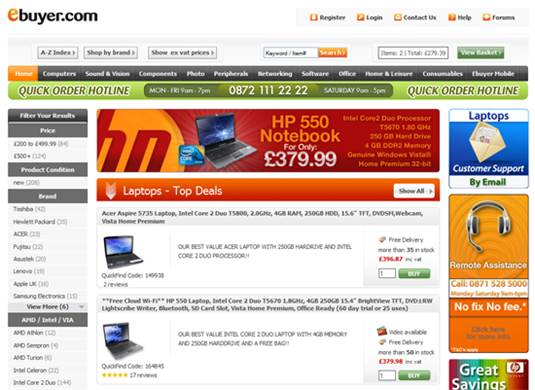Exploring Clearance Sections
Most hardware sales websites have a special
discount, clearance or outlet section, which is used to get rid of stock that
can’t be sold as new for one reason or another. The products in them aren’t
necessarily second-hand (although they might be, particularly if they’re
described as ‘open box’), but they are cheaper, and usually by a significant
amount.

Exploring
Clearance Sections
It’s more likely, however, that these
listings contain a combination of items that are discounted for other reasons.
That might mean the last few units from a discontinued product line that the
retailer can’t replenish or former display items that have been handled or
operated in a limited manner. Sometimes it means products that were returned
but which, after a thorough inspection, have been deemed of sufficient quality
to resell.
It’s a bit of a gamble as to what’s
available, but there’s every chance that you can find something you need or
want in these sections, whether that’s a monitor or mouse. One thing to bear in
mind is that the listings are normally only available in very limited
quantities. If you see a piece of hardware you want, don’t expect it to be
there in a few days’ time. Approach it as if your options were now or never!
Although clearance sections are most
commonly found on the websites of hardware retailers, that’s not the only place
you can find discounted goods. System manufacturers such as Dell or Asus often
have their own outlet website (for example, www.dell.co.uk/outlet or
shop.asus.co.uk/shop/gb/en-GB/Home/1-Products/752-ASUS-Outlet.aspx), where you
can buy returned, refurbished and end-of-line systems at a discount. You’ll
still get a warranty as normal, and you’ll be afforded the same support and
delivery as if you bought a system as new; the only real difference is that the
price is slightly lower.
You don’t even need to be particularly
worried about the quality of clearance and outlet items. Most of the time, it’s
a damaged box or scratch on the case that deems them inappropriate for full
price sale, rather than any serious fault. Indeed, because they’ve usually been
thoroughly tested prior to being placed back on sale, they’re actually less likely
to fail than any random component you buy!
To see how useful clearance sections are in
a practical situation, we trawled the most popular online hardware retailers
looking for clearance sections and seeing what the best deal we could find was.
This is how we got on.
Ebuyer is known for its cheap prices, so
any bargains in its admittedly sparse clearance section
(www.ebuyer.com/search?condition=outlet) are bound to be worth getting your
hands on. Of course, the site also has a reputation for somewhat frustrating
customer service, so you might be tempting fate if you buy items that have
already been through the returns process once. Luckily, it seems to be mainly
ex-display goods.

Ebuyer.com
are an online company that sell discounted computer hardware and little gadgets
on a b2c and a b2b level.
The best deal we found on Ebuyer was
probably an ex-display MacBook Pro, which was reduced from $2783 to $2347. It
was a 2.5GHz Core i5 model with a 13.3” Retina screen, 8GB of RAM and a 256GB
SSD; a similarly-specced model would cost $2721 directly from Apple. A $373
discount on Apple’s famously discount-resistant hardware isn’t bad at all -
that’s almost 14% off retail.
The ‘Clearance Corner’ on Dabs (www.dabs.com/clearance-corner)
was reasonably well-stocked with items, from the cheap to the not so cheap. The
majority of offers appeared to be end-of-line items, since they were mostly
marked ‘while stocks last’. Sadly, every deal we checked turned out to be available
for a lower price with other retailers, so points for effort, but we’d
recommend Dabs as a place to look for hard-to-find items, rather than for
getting the best price.
Following the alliterative example of Dabs,
Aria PC Technology has a ‘Bargain Basement’
(www.aria.co.uk/Products/Bargain+Basement), which turned out to be, er, quite
poorly stocked. There were literally nine products on offer, the best of which
was the LG E2350V 23” monitor, priced $249, down $96 from its RRP and $48 over
any competitors. One thing we can definitely praise Aria for is how clearly the
item’s condition is described. In this case, it was just damaged/replacement
packaging, so at least when you spend your money, you know what you’re getting.
Finally, we looked at Overclockers, whose
‘Clearance Lines’ section was annoying to navigate and search due to its
reliance on either a drop-down menu or a navbar that extends below the bottom
of the screen, but at least the section is full of high-quality hardware that
you might conceivably want, rather than stuff that was previously used to prop
up someone’s desk.
A 3GB Sapphire Radeon HD 7950 FLEX we
spotted was a good $32 cheaper than any competition, at $320. Not bad for one
of the top graphics cards around, which launched at a price of $512 in January
2012. Sadly, the only information given about the card’s condition was that the
product was ‘B Grade’, so it’s hard to tell what was wrong with it. A search on
the site didn’t return any helpful information either. All that means, then, is
that you can be certain that the item you receive will rank somewhere between
‘brand new’ and ‘what a box of corn flakes would look like if they were made of
metal’. Hardly useful. We’d suggest getting on the phone before actually buying
from its clearance section...
Knowing When To Strike…
When you’ve made the decision to buy a
piece of hardware, the immediate impulse is to simply throw down your money and
then bed down outside the letterbox waiting for delivery. But hold on a second.
Before you buy the hardware you want, ask yourself: how likely is it that a
successor to this piece of hardware will be released in the near future?
If a new release is due, it might be worth
holding out for a few more weeks with whatever you still have. The computer
hardware industry is one rife with iterative design practices that can make a
piece of hardware seem practically obsolete within months of you buying it.
Rather than cursing the natural depreciation of your hardware purchases, why
not use the cycle to your advantage?
Look at it this way: if the new version of
the hardware you want is about to hit the market, holding out for a little
while longer could mean the price on the version you actually want will drop
sharply. Retailers want to get rid of their old stock to make way for the new
model, and as it gets closer to shelves they’ll practically shower you with
discounts; even if they don’t, you might just be able to negotiate one.
The risk here is that the product you’re
trying to get a discount on sells out and isn’t refreshed, or the new model
gets pushed back leaving you waiting even longer, but it’s a fairly predictable
cycle and thus worth keeping in mind. If a new graphics card is due in the
autumn and you’re putting your system together in October, can it really hurt
to wait a few weeks in the hope of a discount?

Knowing
When To Strike…
Finding the information you need about
upcoming hardware releases isn’t normally that difficult. Some companies, like
Apple, release products on a fairly regular cycle. Others announce their
roadmaps well in advance, so you can narrow it down to a specific quarter even
months in advance.
If you’re somewhere in the middle of a
hardware release cycle, don’t worry: there are still options. Something we’ve
covered in more detail elsewhere this issue is the potential for
last-generation hardware to represent a better deal to the consumer. Most of
these products will already be discounted, so you don’t have to worry that
you’re paying a premium for hardware that’s about to become second best. It
already is!
It’s true that you’ll lose the bragging
rights you get from having the best hardware in your PC, but if you want to
save a bit of money, roll your ambitions back a generation and watch the pounds
fall away. The thing about current-generation hardware releases is that their
prices are often inflated by high demand and manufacturing scarcity, which
makes them disproportionately expensive. The prices of older hardware have no
such affliction.
A perfect example can be found in the world
of processors. If you look at Intel’s Sandy Bridge and Ivy Bridge CPUs, the
latter line is newer, faster and more expensive, but the difference in terms of
real-world performance is so negligible that you can save money by buying an
equivalently powered Sandy Bridge processor without ever noticing the
difference.
Graphics cards are another section of the
market where this is common. Often the fastest cards from the previous
generation offer similar performance to mid-range cards from the current generation
but cost much less. The thing to remember is that newer doesn’t automatically
mean better, and if you want to save money without taking a major performance
hit, aiming for slightly older (but not decrepit) components is a great way to
do it.
As well as release schedules, it’s also
possible to predict certain sales. You can be sure, for instance, that there’ll
be a new sale in January during the post-holiday rush as retailers attempt to
get consumers spending again. You can also be fairly sure there’ll be a sale of
some kind around summer, as retailers attempt to remind holidaying,
outdoors-enjoying purchasers that the internet still exists. You can even be
sure of the regular thanksgiving sale hitting multiple outlets in the UK,
despite the fact we don’t celebrate the holiday. Such is the power of a good
sale. Plan your purchases accordingly.
Hopefully, that’ll help you spend your
money in an intelligent way. You still have to do the difficult bit, but if you
follow our advice, you’ll be raking in the bargains before long. And if you
wanted to use the money you’ve saved on a subscription to Micro Mart as thanks
for our help, well, who are we to stop you?